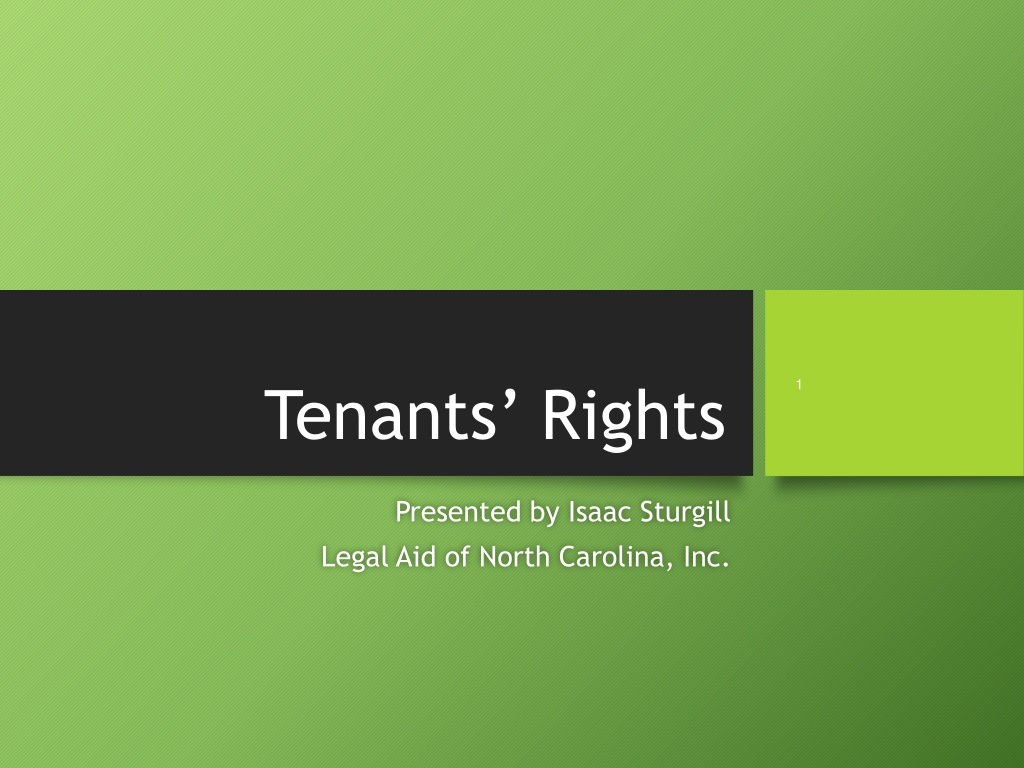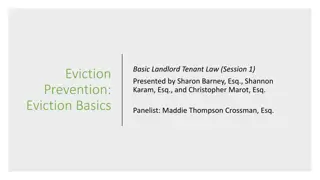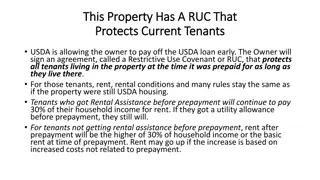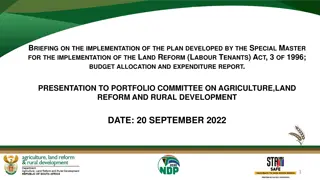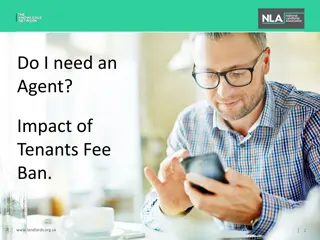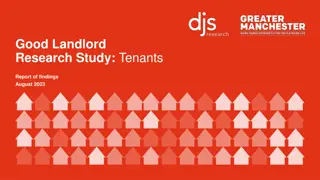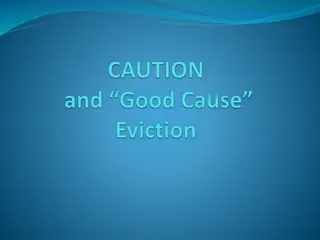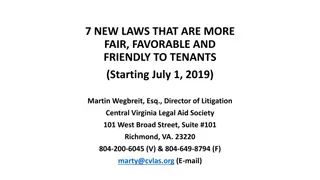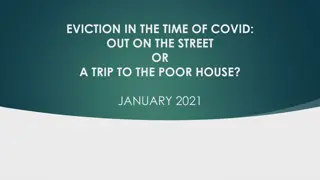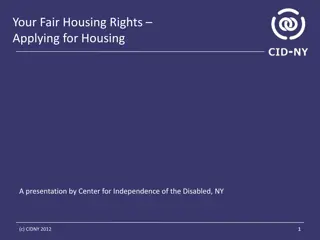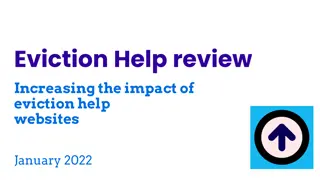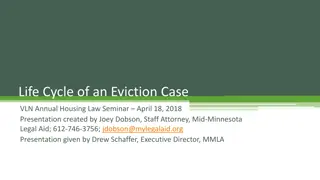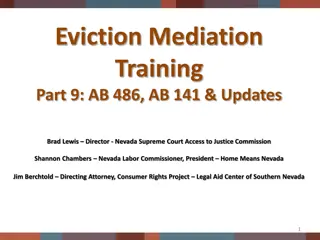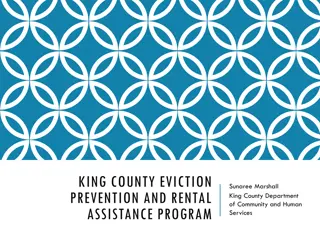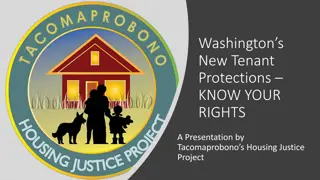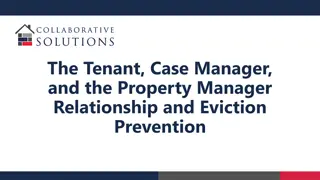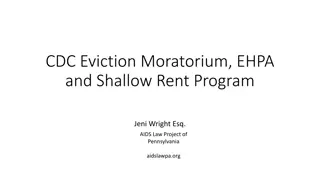Understanding Tenants' Rights and the Eviction Process
Tenants' rights are vital to understand, especially when facing eviction. Being aware of legal procedures, such as the eviction process and the illegality of self-help evictions, can protect tenants from unfair practices. This information outlines crucial points like the grounds for eviction, court proceedings, and the importance of preparing for legal actions.
Download Presentation

Please find below an Image/Link to download the presentation.
The content on the website is provided AS IS for your information and personal use only. It may not be sold, licensed, or shared on other websites without obtaining consent from the author. Download presentation by click this link. If you encounter any issues during the download, it is possible that the publisher has removed the file from their server.
E N D
Presentation Transcript
Tenants Rights 1 Presented by Isaac Sturgill Legal Aid of North Carolina, Inc.
Tenants Rights and Evictions 2 Being evicted can be a scary and stressful experience for a tenant. Some tenants may be at a disadvantage if they are unable to afford a lawyer and are unaware of their basic legal rights.
Self-Help Evictions are Illegal 3 The only legal way a landlord can evict a tenant is by filing a lawsuit. A landlord CANNOT do the following without FIRST obtaining an eviction judgment from the courts Change the locks Shut the utilities off Otherwise force a tenant out of her home Tenants that are victims of self-help evictions may be entitled to damages from the landlord.
The Eviction Process 4 An eviction lawsuit is called an action in Summary Ejectment and is usually filed in Small Claims Court Complaint why the landlord wants to evict the tenant Summons where and when the tenant s court date will be
Case Number 5 Four Grounds for Eviction Case: - Nonpayment of Rent - Holdover - Breach of Lease - Criminal Activity Complaint in Summary Ejectment why the landlord wants to evict the tenant
Case Number 6 Magistrate Summons when & where the small claims court trial will be
Deciding Whether to Go to Court 7 In court, a landlord can ask for: a possession judgment for the property a money judgment for unpaid rent or damages However, a landlord can only be granted a money judgment if Tenant or another adult at home was served personally by the sheriff or signed a return receipt for certified mail OR Tenant goes to court (when served by posting at the property and regular mail) If a tenant has a defense, the tenant must go to court in order to present the defense.
Before Court 8 To prepare for court, a tenant may want to: 1. 2. 3. 4. Practice what she will say. Read the Complaint; File any Counterclaims, if applicable; Gather evidence and witnesses; and
The Trial 9 On the day of court, a tenant may want to: 1. Show up on time; 2. Object to any hearsay during the landlord s case; 3. When it is the tenant s turn, testify and show her evidence; 4. Stay calm; and 5. End her testimony by saying what she wants.
After the Trial 10 If a tenant loses in small claims court, the tenant may wish to appeal. A tenant has 10 days after the judgment is entered to appeal. If a tenant appeals, she will receive a new court date in front of a new judge (trial de novo). A tenant may stay in her home while she is waiting on the appeal if the tenant pays a rent bond. If a tenant does not appeal in time, or if a tenant appeals but does not pay the rent bond on time, the landlord can file for a Writ of Possession.
Appeal Forms 11 Notice of Appeal Required Indigency Petition Optional A valid indigency petition will waive the $150 appeal filing fee. If a tenant receives food stamps, SSI, or AFDC, the tenant may qualify for an indigency petition. Rent Bond Form Required to Stay in Home Without IP , rent bond = back rent + forward rent With IP , rent bond = only forward rent
Some Defenses 12 Notice Cure Nonpayment of Rent Repairs Fair Housing Act Unfair or Deceptive Trade Practices/Unfair Debt Collection Practices
Notice 13 Some leases require notice. Some leases waive notice. with or without demand For nonpayment of rent cases If the lease is a verbal lease, or if it is a written lease without a default provision, the landlord may have to make a demand for the rent and then wait 10 days before filing for eviction. NCGS 42-3.
Cure Nonpayment of Rent and Waiver 14 For a verbal lease or a lease without a default provision, if a tenant pays the rent owed and the court costs to the landlord before court, the landlord should not be able to proceed with the eviction. NCGS 42-33. For other leases, if the landlord accepts money after the breach, the landlord may waive the right to evict
Waiver (continued) 15 However, some written leases allow the landlord to accept a tenant s rent and still pursue the eviction. Called a non-waiver provision If a landlord agrees to accept the tenant s rent and let the tenant stay, the tenant may want the agreement in writing to protect herself.
Demand for possession 16 For holdover (lease expiration) and breach of lease cases, the landlord must make a demand that the tenant surrender possession of the premises before filing the lawsuit. NCGS 42- 26(a). This demand for possession requirement is different than a notice of lease termination, so landlord must demand possession even if the lease and the law does not require notice of termination.
Repairs (implied warranty of habitability) 17 Landlords must obey the local housing code. If a tenant s home needs fixing, the landlord must fix it, no matter what the lease says. A tenant may want to keep track of when they complain about repair issues to the landlord. If the landlord continues to refuse to make needed repairs, the tenant may call 311 to ask a City or County Code Inspector to inspect the home.
Repairs (Continued) 18 Retaliatory Evictions are illegal! A good faith complaint about repairs is a protected act. If a landlord continues taking rent from a tenant while refusing to make needed repairs, the tenant may have a counterclaim against the landlord for rent abatement.
Fair Housing Act (FHA) 19 It is against the law for a landlord to discriminate against a tenant because of race, color, religion, national origin, sex, familial status (children), or disability. If a landlord discriminates against a tenant or refuses to make a reasonable accommodation for a tenant s disability, the tenant may have a defense or claim.
FHA - Reasonable Accommodation Requests 20 Accommodations: changes to the landlord s policies or procedures Anyone with a disability (mental or physical) can request a reasonable accommodation related to their disability The request can be written or oral The request can be denied if not reasonable if it imposes undue financial or administrative burdens on the landlord
FHA Reasonable Modification Requests 21 Modifications: changes to the physical property unit FHA makes it unlawful to refuse to allow a person with a disability to make reasonable modifications of existing property if such modifications may be necessary to afford the tenant the full enjoyment of the premises. The request can be denied if not reasonable if it imposes a fundamental change to the nature of the property These modifications are completed at the expense of individual who made the request.
Unfair or Deceptive Trade Practices 22 Unfair or deceptive practices or acts in commerce are illegal. NCGS 75-1.1. NC appellate courts have decided that landlords who rent properties to tenants are in commerce. The courts have also held that a landlord who knows about needed repairs, refuses to make the repair, and continues demanding rent is committing an unfair trade practice. We pair this claim along with the IWOH claim. It gets us treble (3x) actual damages and attorney s fees.
Unfair Debt Collection Practices 23 It s illegal for a landlord to use deceptive methods or unconscionable means to collect a debt. NCGS 75-54, 55. The most common violation is a landlord who charges a fee he is not legally entitled to. For example, you can only charge one late fee a month, the lease has to allow it, you can t charge it until the rent is more than 5 days late, and it can t be more than 5% of the tenant s share of the rent or $15 (whichever is more). NCGS 42-46.
Unfair Debt Collection Practices 24 If the tenant s rent is subsidized, the 5% must be based off the tenant s share of the rent, not the whole rent. If the late fee provision in the lease is illegal, then the landlord may not charge any late fee. A tenant can get a civil penalty against a landlord no less than $500 nor more than $4,000 per each unfair debt collection violation. NCGS 75-56. Even if a landlord only attempts to collect an illegal fee, that is a violation (no actual damages required).
RENTAL ASSISTANCE 25 Sometimes tenants may not have a legal defense but may be eligible for rental assistance There is a lot of money available for tenants who lost income due to COVID RAMPCLT.COM CRISISASSISTANCE.ORG Apply early!
Questions? 26
